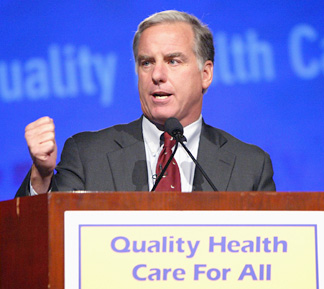Dean, Howard (1948-…), a former governor of Vermont, became nationally known during an unsuccessful campaign for the 2004 Democratic nomination for president. Dean, a physician, also served as the chairman of the Democratic National Committee from 2005 to 2009.

Early life.
Howard Brush Dean III was born on Nov. 17, 1948, in New York City. He received a bachelor’s degree in 1971 from Yale University. In 1978, he earned a medical degree from Albert Einstein College of Medicine. He moved to Vermont in 1978 to do his medical residency and began private practice there as a physician, specializing in internal medicine.
Political career.
In 1982, Dean was elected to the Vermont House of Representatives. In 1985 and 1986, he served as assistant minority leader of the Vermont House. In 1986, he was elected lieutenant governor of the state. In Vermont, the governor and lieutenant governor are elected independently and serve two-year terms. Dean served two terms under Governor Madeleine M. Kunin, a Democrat. In 1990, Dean was elected to a third term as lieutenant governor, this time under Governor Richard A. Snelling, a Republican. Snelling died on Aug. 13, 1991, and Dean succeeded him. Dean was elected to a full term as governor in 1992 and reelected in 1994, 1996, 1998, and 2000. In 1994 and 1995, he served as chairman of the National Governors Association, made up of the governors of the states, territories, and commonwealths of the United States.
As Vermont’s governor, Dean helped to bring the state’s budget into balance. His achievements also included health care reform, an overhaul of the state’s welfare system, and the setting aside of millions of dollars for land preservation.
National campaigns.
In 2003, Dean declared his candidacy for the 2004 Democratic nomination for president of the United States. His opposition to the war in Iraq and his blunt speaking style won him national attention. He also won much support of the “Netroots” community—that is, followers of widely read political blogs, or online journals, on the Internet. However, Dean dropped out of the race in early 2004 due to insufficient voter support.
In 2005, Dean became the chairman of the Democratic National Committee (DNC). He implemented a “50-state strategy,” in which the party directed financial resources to support strong Democratic candidates in every area of the country. Political analysts praised the strategy for helping the Democrats make historic gains during elections in 2006 and 2008.
Dean left the DNC in 2009. He began work as a television political analyst and spoke in support of health care reform.
